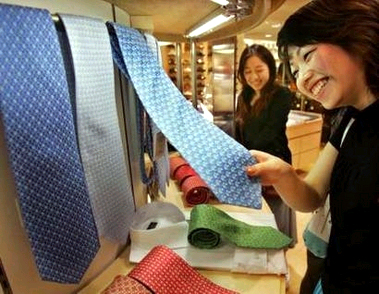
For its sagacity and legislative advances in policies both domestic and international, Japan yet subscribes to fractured doctrines of the last century — a belief in global warming on account of man the most peculiar and intrusive of them. Resting on a scientific basis as ungainly as that of every American twenty-something's fourth or fifth grade teacher, Tokyo chose the month of June to launch a campaign dubbed "Cool Biz," inviting the nation's shopkeepers and executives to keep employees' high collars, long sleeves and ties at home for the summer. Workers with less clothes could stand a warmer office and reduce carbon dioxide emissions from air-conditioners which, through the convoluted reasoning of pseudo-science, must somehow be affecting a planet whose climate has changed drastically and repeatedly without the help of modern industry.
Politics aside, "Cool Biz" has impressed neither companies with faith in uniform nor those who furnish business attire.
If not for the officious public advice and the private sector's reluctant tap dance, however, we may not have been able to learn from a string of informally polled businessmen just how thoroughly Japanese professional propriety has resisted the West's inexorable trend to formal-casual:
Employees of TEPCO put a business card-sized badge on their chests that says, "Excuse me for being casually dressed," in consideration that some customers might be offended by their casual attire. On the other hand, many workers say they feel uneasy wearing the light attire."When I have to meet customers older than me, I feel uncomfortable," an NTT East Corp. employee said. ...Even employees of companies that encourage them to dress lightly reportedly wear a tie when they leave home to avoid looking too casual in front of their neighbors and take it off when they arrive at the office.
Bless the button-down — and its accidental challenge.